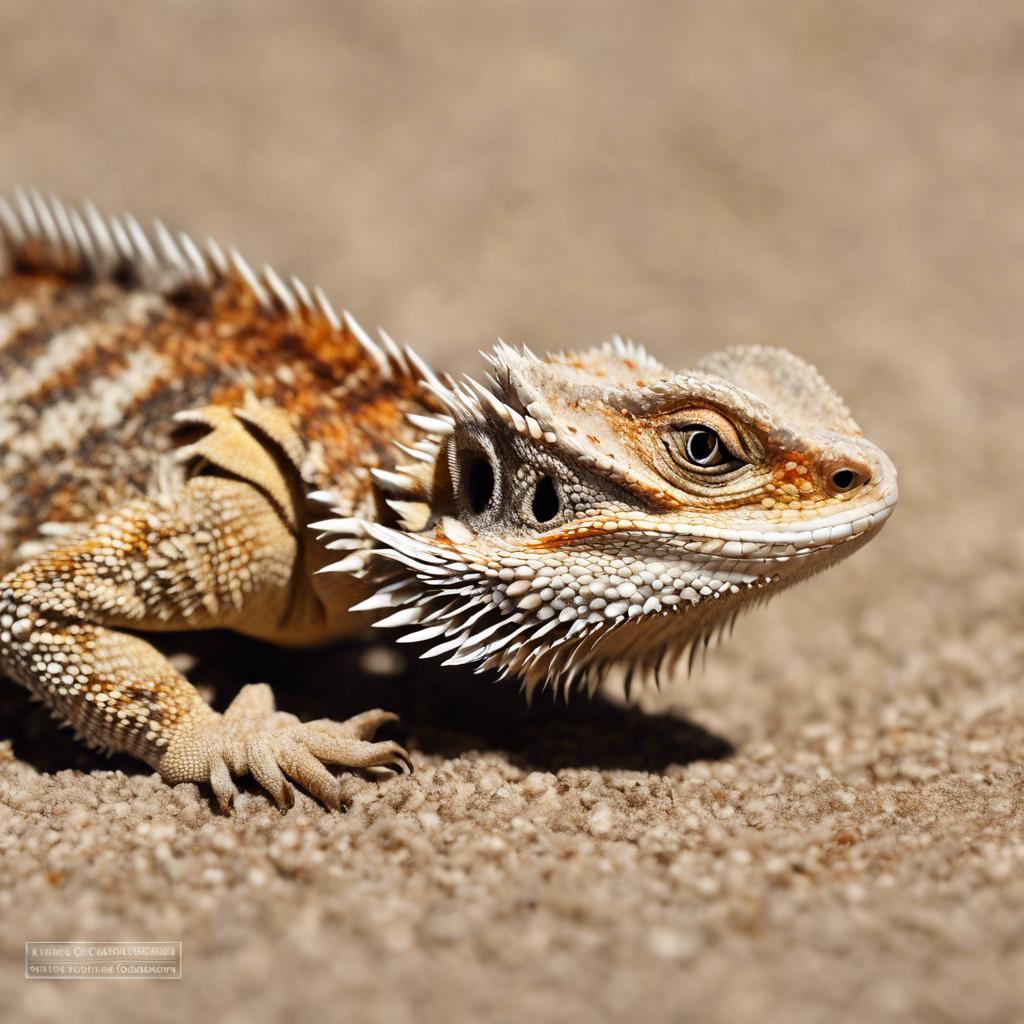Bearded dragons are popular reptile pets known for their unique appearance and docile nature. However, like any living creature, they can experience health issues from time to time. One common issue that many bearded dragon owners face is the development of white patches on their pet's skin. These white patches can be concerning for owners, as they may indicate an underlying health problem. In this article, we will explore the causes, symptoms, diagnosis, treatment, and prevention of white patches on bearded dragons.
Key Takeaways
- White patches on bearded dragons can be a sign of a health issue.
- Causes of white patches on bearded dragons can include fungal or bacterial infections, shedding, or injury.
- Symptoms of white patches on bearded dragons can include discoloration, flaking skin, and lethargy.
- Diagnosis of white patches on bearded dragons may involve a physical exam, skin scraping, or blood tests.
- Treatment for white patches on bearded dragons may include medication, topical treatments, or changes in diet and habitat.
Causes of White Patches on Bearded Dragon
There are several reasons why bearded dragons may develop white patches on their skin. One common cause is a fungal or bacterial infection. These infections can occur due to poor hygiene or unsanitary living conditions. Another cause of white patches is shedding. Bearded dragons shed their skin periodically as they grow, and during this process, white patches may appear. Additionally, other health issues such as nutritional deficiencies or metabolic bone disease can also lead to the development of white patches on a bearded dragon's skin.
Symptoms of White Patches on Bearded Dragon
If your bearded dragon has white patches on its skin, there are several symptoms you may notice. Changes in behavior can be an indication that something is wrong. Your bearded dragon may become lethargic or less active than usual. They may also show a decrease in appetite or refuse to eat altogether. In some cases, the appearance of the white patches may cause discomfort or pain for the dragon, leading to changes in their behavior. Additionally, the white patches themselves may appear flaky or dry, and the affected areas may become red or inflamed.
Diagnosis of White Patches on Bearded Dragon
If you notice white patches on your bearded dragon's skin, it is important to seek veterinary care for a proper diagnosis. A veterinarian who specializes in reptiles will be able to examine your dragon and determine the cause of the white patches. They may need to perform tests such as skin scrapings or cultures to identify any fungal or bacterial infections. In some cases, a biopsy may be necessary to rule out more serious health issues. By conducting a thorough examination and diagnostic tests, the veterinarian can provide an accurate diagnosis and recommend appropriate treatment.
Treatment for White Patches on Bearded Dragon
The treatment for white patches on a bearded dragon will depend on the underlying cause. If a fungal or bacterial infection is present, the veterinarian may prescribe medication such as antifungal or antibacterial creams or oral medications. Topical treatments may also be recommended to soothe any discomfort or inflammation. In cases where the white patches are due to shedding, providing a proper shedding environment and ensuring adequate humidity can help facilitate the process. Additionally, if nutritional deficiencies are identified as the cause, changes in diet or supplementation may be necessary.
Prevention of White Patches on Bearded Dragon

Preventing white patches from developing in the first place is always preferable to treating them. Proper care and attention can go a long way in keeping bearded dragons healthy. Maintaining a clean and sanitary habitat is crucial to prevent fungal or bacterial infections. Regular cleaning of the enclosure, including removing waste and disinfecting surfaces, can help reduce the risk of infection. Providing a balanced diet that meets all of your bearded dragon's nutritional needs is also essential for their overall health and wellbeing.
Importance of Bearded Dragon Care
Proper care and attention are vital for the health and happiness of bearded dragons. These reptiles have specific habitat requirements that must be met to ensure their wellbeing. They need a spacious enclosure with appropriate temperature gradients, UVB lighting, and hiding spots. Regular cleaning and maintenance of their habitat are necessary to prevent the development of health issues. Additionally, providing a varied and balanced diet that includes a mix of insects, vegetables, and fruits is crucial for their nutritional needs.
Proper Nutrition for Bearded Dragons
Bearded dragons require a diet that consists of both animal protein and plant matter. Insects such as crickets, mealworms, and dubia roaches should make up a significant portion of their diet. These insects provide essential nutrients such as protein and calcium. However, it is important to ensure that the insects are gut-loaded with nutritious food before feeding them to your dragon. In addition to insects, bearded dragons should also be offered a variety of vegetables and fruits. Leafy greens, such as collard greens and kale, are excellent sources of vitamins and minerals for them.
Habitat Requirements for Bearded Dragons
Creating the right habitat for your bearded dragon is crucial for their overall health and wellbeing. They require an enclosure that is large enough for them to move around comfortably. The enclosure should have a temperature gradient, with a basking spot that reaches around 100 degrees Fahrenheit and a cooler area around 80 degrees Fahrenheit. UVB lighting is essential for bearded dragons to metabolize calcium properly, so providing a UVB light source is necessary. Additionally, they need hiding spots and branches or rocks to climb on to mimic their natural environment.
Common Health Issues in Bearded Dragons and How to Prevent Them
Bearded dragons can be prone to several health issues if not properly cared for. Some common health problems include metabolic bone disease, respiratory infections, parasites, and impaction. To prevent these issues, it is important to provide proper nutrition, maintain a clean habitat, and seek regular veterinary check-ups. Regular check-ups with a reptile veterinarian can help identify any potential health issues early on and prevent them from becoming more serious.
In conclusion, white patches on bearded dragons can be a cause for concern for owners. It is important to seek veterinary care if you notice white patches on your dragon's skin. By understanding the causes, symptoms, diagnosis, treatment, and prevention of white patches, you can ensure the health and wellbeing of your bearded dragon. Remember to provide proper care and attention, including a balanced diet and a suitable habitat, to keep your bearded dragon happy and healthy.
If you're concerned about white patches on your bearded dragon, it's important to understand the potential causes and how to address them. One related article that can provide valuable insights is “Can Bearded Dragons Die from Stress?” This article explores the impact of stress on bearded dragons and offers tips on how to minimize stress levels in your pet. Understanding the connection between stress and health issues, such as white patches, can help you provide the best care for your bearded dragon. (source)
FAQs
What are white patches on bearded dragons?
White patches on bearded dragons are areas of the skin that have lost pigmentation and appear white or pale in color. These patches can occur anywhere on the body, including the head, limbs, and tail.
What causes white patches on bearded dragons?
White patches on bearded dragons can be caused by a variety of factors, including genetics, injury, infection, or stress. In some cases, the patches may be a sign of a more serious underlying health condition.
Are white patches on bearded dragons harmful?
In most cases, white patches on bearded dragons are not harmful and do not cause any health problems. However, if the patches are accompanied by other symptoms such as lethargy, loss of appetite, or difficulty breathing, it may be a sign of a more serious health issue.
How can white patches on bearded dragons be treated?
Treatment for white patches on bearded dragons depends on the underlying cause. If the patches are caused by injury or stress, providing a comfortable and stress-free environment may help. If the patches are caused by infection, a veterinarian may prescribe medication to treat the underlying condition.
Can white patches on bearded dragons be prevented?
While it may not be possible to prevent all cases of white patches on bearded dragons, providing a healthy and stress-free environment can help reduce the risk. This includes providing proper lighting, temperature, and humidity levels, as well as a balanced diet and regular veterinary check-ups.

